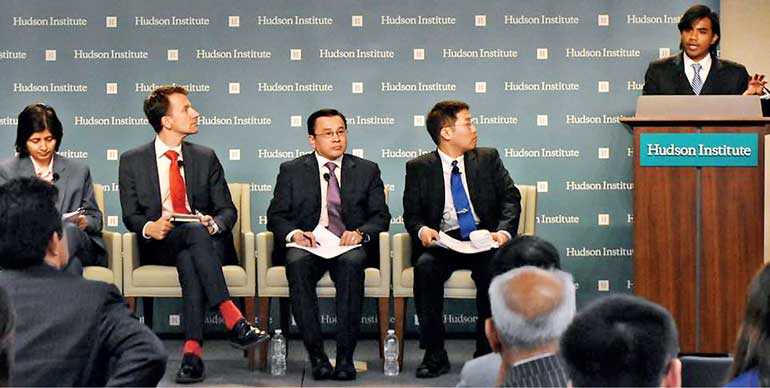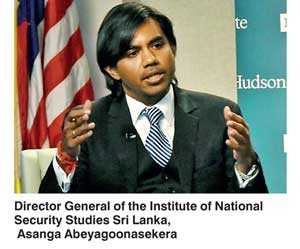Sunday Feb 22, 2026
Sunday Feb 22, 2026
Tuesday, 24 April 2018 00:00 - - {{hitsCtrl.values.hits}}


Asanga Abeyagoonasekera, Director General of the Institute of National Security Studies Sri Lanka (INSSSL), was invited to speak on the panel discussion titled ‘China’s Growing Influence in the Indian Ocean: Implications for the US and Its Regional Allies’ at prestigious Washington DC-based think tank, the Hudson Institute, on 20 April.
The INSSSL Director General emphasised the important role Sri Lanka could play as the “regional stabiliser” in the Indian Ocean Region (IOR) due to the Island’s geostrategic position.
“Geopolitical thinker Halford Mackinder rightly identified, almost a century ago, the two outer islands in his work which is Great Britain playing a significant role in the Atlantic Ocean and Japan in the Pacific Ocean. Sri Lanka, sitting on the outer crescent, is also an island which could play a significant role in the Indian Ocean in this century, especially as a stabiliser and promote peace as rightly spelled out in 1971 by Madam Sirimavo Bandaranayake as the ‘Indian Ocean as a Zone of Peace’,” he said.
Referring to the works of geopolitical thinker Rudolf Kjellen, he said China had already developed three primary attributes to be considered a great power which are spaciousness, freedom of movement and internal cohesion.
Abeyagoonasekera said China’s One Belt One Road (OBOR) initiative was the modern day Marshal Plan of China to assist many developing nations and project itself as a global power. He said it was wrong to see Chinese loans as predatory loans since China had assisted many developing nations to build infrastructure. He added that India should not worry about the Chinese sphere of influence in Sri Lanka because all foreign policy decisions were carefully calibrated by Lankan policymakers along with the experienced Foreign Service officers and they were not kneejerk reactions.
“Sri Lanka would never allow military bases as we promote peace in the region. The key challenge is even after 70 years of independence from a colonial past, India, Sri Lanka and surrounding nations have failed to develop the economic condition,” asserted Abeyagoonasekera.
The other panellists included Saturo Nagao - Visiting Fellow Hudson Institute; Aparna Pandey - Research Fellow and Director of the Initiative on the Future of India and South Asia, Hudson Institute and Toshi Yoshihara - Senior Fellow at the Center for Strategic and Budgetary Assessments. The panel was moderated by Jonas Parello-Plesner - Hudson Institute Senior Fellow.